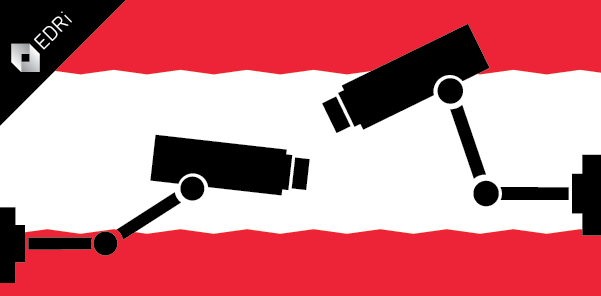Proposed surveillance package in Austria sparks resistance
The Austrian coalition parties have renegotiated their government programme in January 2017. This new programme contains a so-called “security package” that encompasses the introduction of several new surveillance measures and additional powers for the Austrian security agencies. These changes in the law are to be implemented by June 2017.

However, so far no evaluation of already existing surveillance measures and investigatory powers has been carried out. Furthermore, it is doubtful that the new measures will bring about an increase in security, whereas they will severely limit fundamental right to privacy and dial back on existing data protection measures.
The following measures are outlined in the newly agreed government programme:
Networked CCTV monitoring: The Austrian Minister of the Interior Wolfgang Sobotka has repeatedly demanded “all-encompassing surveillance” of public spaces by linking already deployed CCTV cameras operated by both private and public entities, and even transmitting the footage to investigative authorities in real time. The implementation of this kind of surveillance apparatus would effectively create a true panopticon affecting every citizen. However, in light of the terrorist attack in Nice in mid-July 2016 on a promenade monitored by several surveillance cameras, any preventive effect of the surveillance of public spaces is highly doubtful, even with respect to conventional crimes: The Police Directorate of Vienna has removed 15 out of its 17 CCTV installations during the recent years due to high operating costs and no discernible benefits in combating crime.
Automatic license plate recognition: The government wants to implement a system which would recognise all licence plate numbers and retain details of the movements of all vehicles on Austrian highways. In 2007, the Austrian constitutional court decided in a similar case (Section Control) that surveillance of car drivers is only permitted for a few determined routes and that number plate information can only be retained if the vehicle was driving too fast or is on an official wanted list. The new government programme facilitates an unjustified storage of movements for all vehicles, which is very alarming.
Government spyware: In 2016 there was a legislative proposal to legalise the use of government spyware on electronic devices of Austrian citizens. Due to massive criticism from a legal and technical perspective, the Austrian Minister of Justice Wolfgang Brandstetter withdrew the proposed law. In 2008 a commission of constitutional experts under Professor Bernd-Christian Funk came to the conclusion that government spyware is not in line with Austrian constitutional law. Nonetheless, the Austrian government has started a third attempt to pass a legal basis for this unconstitutional measure.
Data Retention Directive 2.0: The Austrian data retention law was abolished by the Austrian constitutional court in 2014 due to its unconstitutionality and violation of fundamental rights. The European Court of Justice (CJEU) confirmed this decision in December 2016 by passing an even further reaching verdict against this type of unfounded mass surveillance. Nevertheless, the new government agreement contains plans for a “quick freeze” based retention of telecommunication data. The final legislative text will have to be scrutinised carefully to define if it is in line with recent CJEU rulings.
Registration of prepaid SIM cards: The Austrian government plans to forbid unregistered prepaid SIM cards and thus to eliminate a way of communicating freely and anonymously with family members, help lines, and persons of trust (such as lawyers). Criminals can easily circumvent this by using foreign SIM cards or online messaging services, making the measure ineffective and disproportionate.
“Subversive movements”: It must be possible to criticise the state or institutions. The government wants to establish a criminal offense for the expression of opinions which undermine the authority of the state. This is a crucial development which stands against the fundamental principle of freedom of expression.
Electronic tags for non-convicted “endangerers”: Another critical demand in the security package is the introduction of electronic tags – a surveillance device locked to an individual’s body – for “endangerers”. But the term “endangerer” (“Gefährder”) is legally not defined and the federal government calls such a person a potential disturber and refers to an “abstract endangering situation” (“abstrakte Gefährdungslage”). So far, electronic tags have been used only for convicted perpetrators or in cases of strong suspicion. This extended use of electronic tags is highly problematic as it violates the principle of presumption of innocence. Similar discussions are ongoing in Germany.
Resistance has been mounting over the proposed extension of surveillance measures in Austria. EDRi observer, epicenter.works and other fundamental rights NGOs in Austria are working to mobilise the population to stop the unprecedented and unfounded surveillance measures in the new government programme to be enacted.
Surveillance package – government plans complete surveillance (only in German)
https://epicenter.works/thema/ueberwachungspaket
Surveillance: Cameras are being removed again (only in German, 28.01.2017)
https://kurier.at/chronik/kameras-werden-wieder-abgebaut/243.543.107
Opportunity and risk of state spyware (only in German, 26.04.2016)
http://diepresse.com/home/panorama/oesterreich/4976263/Staatstrojaner_Chance-und-Risiko
German “Bundestrojaner” – The dismantling of state spy software (only in German)
https://epicenter.works/thema/bundestrojaner
Epicenter.works
https://epicenter.works
(Contribution by EDRi observer epicenter.works, Austria)


